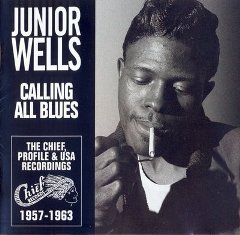Junior Wells – Calling All Blues (2000)
Junior Wells – Calling All Blues (2000)

01 - Two Headed Woman (Weaver, Dixon) 1957
02 - Lovey Dovey Lovey One (London) 1957
03 - I Could Cry (Wells) 1957
04 - Cha Cha Cha in Blues (Cut my toe nail) (Wells, Dixon) 1957
05 - Little by Little (I'm loosing you) (London) 1958
06 - Come on in This House (London) 1959
07 - You Don't Care (Wells) 1960
08 - Prison Bars All Around Me (Wells) 1960
09 - Calling All Blues (Hooker, Wells) 1960
10 - Galloping Horses A Lazy Mule (Hooker, Wells) 1960
11 - Messin' With the Kid (London) 1961
12 - You Sure Look Good to Me (Wells) 1961
13 - So Tired (Berry) 1961
14 - Universal Rock (Hooker) 1961
15 - I Could Cry (Wells) 1961
16 - I'm a Stranger (Wells) 1961
17 - Things I Do For You (London) 1961
18 - Love Me (Wells, London) 1961
19 - It Hurts Me Too (When Things Go Wrong) (Whittaker) 1961
20 - I Need Me a Car (London) 1961
21 - I'll Get You Too (Emerson, Dixon) 1963
22 - One Day (Every Goodbye Ain't Gone) (Emerson, Dixon) 1963
23 - She's a Sweet One (Dixon) 1963
24 - When the Cat's Gone the Mice Play (Dixon) 1963
Junior Wells (vocals, harmonica); Willie Dixon (bass) Syl Johnson, Earl Hooker (guitar).
Following his recorded debut as a leader for States Records, Junior Wells signed with Mel London, producing a number of sides for the producer's Chief and Profile imprints. Perhaps best-known for his spectacular harmonica playing, this period, documented on Calling All Blues, saw Wells emerging as an outstanding vocalist as well. A consummate performer with a firm grasp of the range of emotions the music can produce, Wells wrings every drop of feeling out of the lyrics. The singer growls, shouts, howls, moans across these 24 tracks including two versions of his great "I Could Cry" and other classics like "Little By Little," "Cha-Cha-Cha in Blue," and "Lovey Dovey Lovey One." While it has a great deal of overlap with the collections from Paula Records, Calling All Blues remains a fine introduction with no glaring omissions. The bulk of the compositions come from three sources: his employer, London; the "poet of the blues," Willie Dixon; and Wells himself. While the recording quality may be shaky at times, it's to be expected and in fact only adds to the feeling of authenticity emanating from the music. It's like stepping inside a hot, sweaty room for a forbidden peek at a late-night jam session. Wells and company imbue the material with such intensity, it can almost be overwhelming at times. For the most part, the singer leaves his harp alone, but the handful of harmonica moments are memorable. On the instrumental title track, he lays into his instrument, battling for space amongst piercing guitar and piano leads. Only when the music is tempered by the more popular forms of rock & roll and R&B on songs like "I'll Get You Too," "One Day (Every Goodbye Ain't Gone)," and "I Need a Car" does it begin to lose its potency. Leading up to the sessions that produced Wells' classic 1966 album Hoodoo Man Blues, this is electric blues at its fiery best. ---Nathan Bush, allmusic.com
download (mp3 @320 kbs):
yandex mediafire ulozto solidfiles global-files
Last Updated (Friday, 19 March 2021 17:31)
